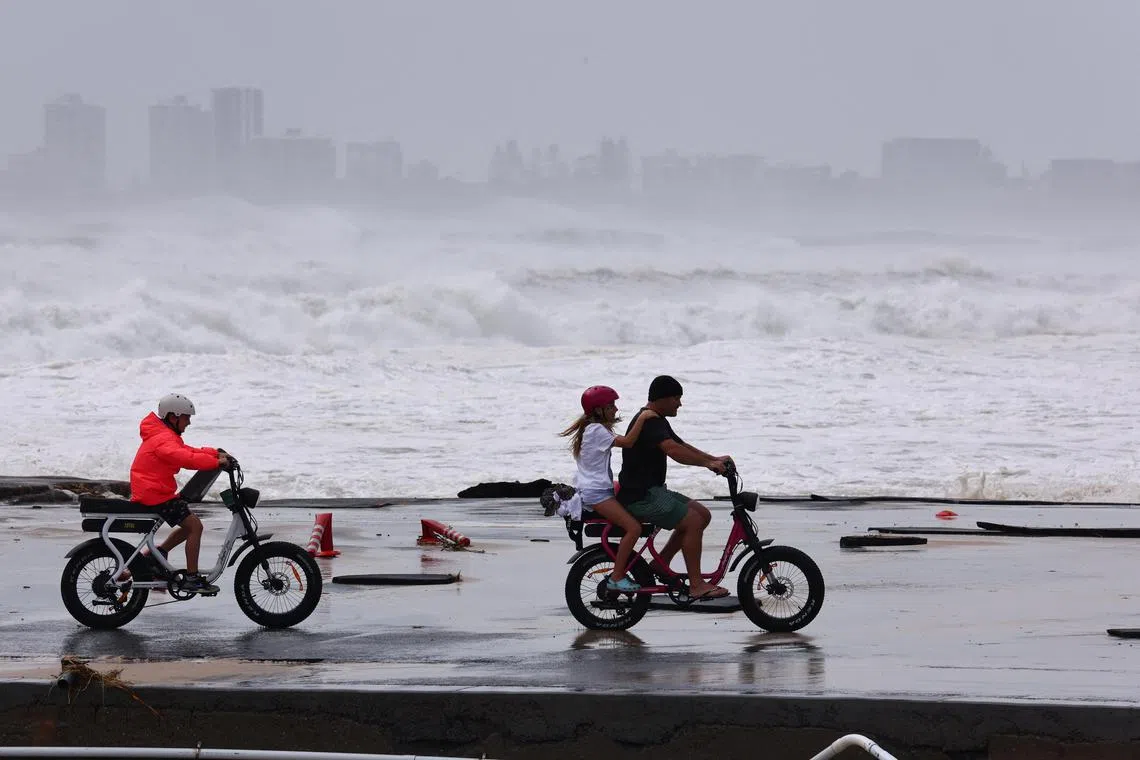Australia tells thousands to evacuate as Tropical Cyclone Alfred nears
Sign up now: Get insights on Asia's fast-moving developments

Wind gusts of more than 100kmh smashed the coastal border regions of the states of Queensland and New South Wales overnight.
PHOTO: REUTERS
Follow topic:
SYDNEY – Thousands of residents in Australia’s east were ordered to evacuate ahead of Tropical Cyclone Alfred’s landfall
Alfred’s slow progress towards the coast fed concern that it could bring a prolonged period of heavy rain. It is expected to hit land as a Category 2 storm north of Brisbane, Australia’s third-most populous city, the Bureau of Meteorology said.
“The evacuation centres are a last resort,” Queensland Premier David Crisafulli told a news conference on March 7, adding that dozens had been opened.
“Have an evacuation plan if you are in one of those areas,” he urged those in the cyclone’s path, advising them to secure their homes before evacuating.
“If in doubt, go and stay with friends and families.”
Wind gusts of more than 100kmh lashed the coastal regions of Queensland and New South Wales states overnight. The storm moved slowly west 120km from Brisbane and 85km from the tourist city Gold Coast, the weather bureau said.
It brought turmoil that snapped power links to more than 80,000 homes across the two states, electricity firms said, around half of them in the Gold Coast.
Television footage showed surfers riding in the huge seas and people strolling near the beaches, forcing officials to warn residents to stay indoors or prepare to evacuate when asked.
Prime Minister Anthony Albanese said: “This isn’t a time for sightseeing or for seeing what it’s like to experience these conditions first-hand. Please stay safe. Be sensible.”
He told reporters that 120 defence personnel will help the emergency crews with rescue and relief efforts.
In a television interview, he ruled out calling a national election for April on March 9 or March 10, as had been expected, so his government can focus on the approaching cyclone.
“I have no intention of doing anything that distracts from what we need to do. And what we need to do is to look after each other at this difficult time,” he said in an interview with Australian Broadcasting Corporation.
A national election must be held by mid-May, and had been expected for April, so the government could avoid delivering a national budget forecast to show a deficit. The preparation work had been done to deliver a budget on March 25, Mr Albanese said.
Flood impact
Heavy rains drenched some regions in northern New South Wales, with more than 400mm dumped over the last 48 hours, exceeding the mean total for March, data showed, as residents scrambled to save properties from possible flooding.
New South Wales business owner Thomas Gough has been busy putting sandbags at his shop in Lismore, a rural town about 700km north of Sydney that was devastated by major floods in 2022.
“It’s a beautiful place to live most of the time, but it feels like we have one-in-100-year events every five years – there’s nothing we can do about it,” he told ABC News.
Brisbane Airport shut down operations on the afternoon of March 6, while public transport in the city has been suspended. More than 1,000 schools in south-east Queensland and 280 in northern New South Wales have been closed.
Officials have called Alfred a “very rare event” for Brisbane, Queensland’s state capital, with the city last hit by a cyclone more than half a century ago in 1974. The city of around 2.7 million had near misses from cyclones in 1990 and 2019. REUTERS

